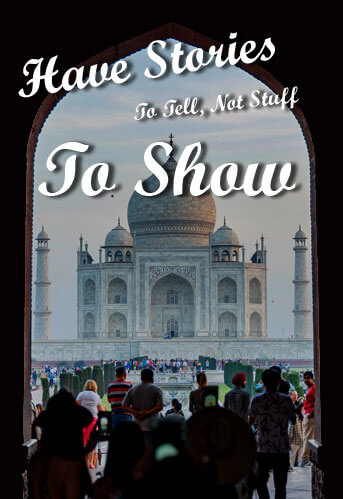Category: Rajasthan Tour Packages
A Guided Walking Tour of Jaipur’s Old City
BY Admin
Rajasthan’s capital city, Jaipur invites tourists in abundance from all over the world. The town is well-known as the Pink City of India because of the pink hue in the city. Jaipur is a major part of India’s most popular and searchable Golden Triangle Tour which covers Jaipur along with Delhi and Agra. Jaipur’s many tourist attractions are located in the old city. Each of them is not much spread out, so one can easily explore on foot. This well-guided walking tour of Jaipur Old City, or if your legs get tired, you can hire a cycle rickshaw.
Tour Commence From M.I. Road, Panch Batti Circle
Duration: Half Day
If you have an interest in finding some stunning art piece, then M.I. Road is where you’ll find all sort of shops, but the two most recommended ones are the Gem Palace and Juneja Art Gallery. Juneja Art Gallery is a worth browse if you feel like contemporary art, including abstract, semi-abstract, surreal, and figurative art pieces. Gem Palace is owned by the jeweler’s family that once served the royal family, it’s been in existence for eight generations.

Continuing through the old city lanes along M.I. Road, you will come across the pink walls of Jaipur on your left. Three gates spaced around 500 meters apart which you will get an entry into the Old City. The first one is Ajmeri Gate, followed by New Gate, and lastly Sanganeri Gate. Enter from Ajmeri Gate and turn right, from there you can walk all way along to Sanganer Gate and the start of Johari Bazaar. Straight streets running in a grid forming a series of bazaars, the first that you’ll encounter is Nehru Bazaar. A favorite one among the women of Jaipur, all the shops of this bazaar sell brightly colored fabric, shoe trinkets, and perfumes. Stroll along and browse through the shops until you reach Sanganeri Gate and Johari Bazaar.

Located just opposite to Sanganeri Gate, Johari Bazaar is on the road that leads north to Badi Chaupar, turn left into it and stroll straight. Johari Bazaar and the lanes are known for gold and silver jewelry, as well as inexpensive costume jewelry and bangles. Continue walking straight, you’ll reach Jaipur’s most famed landmark, Hawa Mahal which is a marvelous example of Rajput architecture was constructed in 1799 by Maharaja Sawai Pratap Singh. The palace was made so that the royal ladies of the palace could look out over the street, from 953 small windows unobserved.

Next, proceed for the magnificent City Palace, which blends Rajasthani and Mughal architectural style very beautifully. The structure of this palace has been dated back to the early 20th century. The most stunning part of City Palace is the Peacock Gate which is located in a small courtyard known as Pritam Niwas Chowk. As you head out of the City Palace, make a stop at Jantar Mantar- an observatory was constructed by Jai Singh in 1728. He constructed five observatories in various cities in India, but this one is the biggest and well-maintained. Jantar Mantar is a collection of massive and strange sculptures constructed with the purpose of calculated eclipses. It is featured with the largest instrument called sundial, which casts a shadow that moves up to four meters an hour.
As you head out from Jantar Mantar, follow the road out to Tripolia Bazaar. The market has got its name from Tripolia Gate, with its tree archways. This is the main entrance to the City Palace and Jantar Mantar, although the royal family members and their guests are allowed to enter the way. Nearby is the tallest structure of the town, Iswari Minar Swarga Sal, the heaven-piercing minaret. It serves an excellent reference point to your ending location of Walking Tough of Jaipur’s Old City.

Whether you are on a holiday trip with family or friend in Jaipur, this guided walking tour will surely give you amazing and memorable days in the town. If you are a first timer in the country, then you must book your Golden Triangle Itinerary according to the day you want to spend in India and get a wonderful experience of rich Indian culture, traditions, heritage, and historical monuments that broadly speaks out the glorifying history of the erstwhile rulers.
Leave a Reply
Your email address will not be published. Required fields are marked *

Blog Category
- South India Tour
- Rajasthan Tour Packages
- Temples of India
- Golden Triangle Tours
- Golden Temple Tour
- India Tour Packages
- Tours
- About Golden Triangle Tour
- Golden Triangle Tour A Real Life Experience
- Special Interest Tours
- Wildlife Tours of India
- Udaipur Tour Package
- visa for india
- Volunteering in India
Recent Posts
- Top 5 places to visit near Delhi in Winters Holidays 2020
- What makes Golden Triangle Tour Circuit a famous one in India?
- Solo India Travel: Top 10 essential tricks for a memorable Solo Travel in India
- Top 10 things to shop in Jaipur Sightseeing Tour: No. 9 must-not-miss!
- Top 10 things to do in Udaipur while on a Golden Triangle Tour with Udaipur
- Top 10 Religious Destinations in South India: South India Temple Tour
- Mark your Calendar with these top 10 most popular festivals in India in October 2019…!!!
- Top 10 Golden Triangle Tour Extensions
- Top 10 cities of Rajasthan
- Top 10 temples of North India

